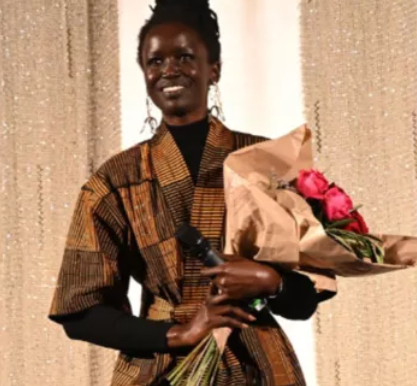Akuol de Mabior’s regaled the stage at the Berlin International Film with confidence and poise, rare for a novice while presenting her debut documentary to the world last week.
The documentary sheds light on Akuol’s family coping with and having had to go back home from exile after the death of her father, Dr. John Garang de Mabior.
“We need to think about what it means to go back home and express our concern and our discomfort without fear of being shamed for not finding it easy to come back home,” Akuol de Mabior said, as she premiered on the world stage at the Berlin International Film Festival.
In an interview with Radio Tamazuj, she said the film is about a personal journey to trying and figure out what it means to call South Sudan home.
“ ‘No simple way home’ is a story about family and country, how you reconcile the personal and political and also it is a personal journey to trying and figure out what it means to call South Sudan home; we know that our country is young and we are all trying to find our identity,” Akuol said.
She mirrors her family in the movie, drawing close attention to her mother’s journey back to politics and her late father, John Garang, a man who would come to be known as the leader who laid the foundations for South Sudan to be declared independent in 2011.
“In the film, it is my mother, Rebbecca Nyandeng de Mabior’s journey back into politics and my sister Nyankuer Garang de Mabior, who working closely with my mother and who has moved back home and for me is a good example of somebody who is thinking deeply about what it means to come back home and to make her contribution,” Akuol said. “And then there is me as well who is still struggling to find out what it means to be a South Sudanese and then of course also my father plays a big role in the film.”
Rebbecca Nyandeng de Mabior’s career in politics sprouted from her marriage in 1975. After the death of her husband, she continued to be a strong advocate for the implementation of the Comprehensive Peace Agreement (CPA) that was signed by her husband Dr. John Garang before his death in 2005. Today she is seen as the mother of the nation by many.
“I had a feeling that my mother, who is one of the vice presidents of South Sudan, contributions to the movement will not be recognized and wanted to highlight her contributions,” she intimated. “I was worried that her contributions would not be remembered, that’s how the story came about.”
For decades South Sudan descended into a civil war which lead to many fleeing outside of the country and seeking asylum out of the country. Akuol said that this is all part of history and South Sudanese can now think of what lies ahead of them.
“I think it is part of our history but because we now have our own country, we can begin to think about what lies beyond the problems, what it look like to be at home what kind of jobs we would like to have, what kind of family we would like. I think we can now start to think about what it means to be free more than what it means to fight to be free,” She said.
She added: “I hope that the film will be seen widely and that it reaches the South Sudanese audience. A lot of us are still living outside the country and I hope it gives people a picture of what it looks like to come home. I hope it encourages people to think about what it would look like for them to come home and I hope it encourages conversations between younger people and older people who are in a position of power and ordinary citizens.”




